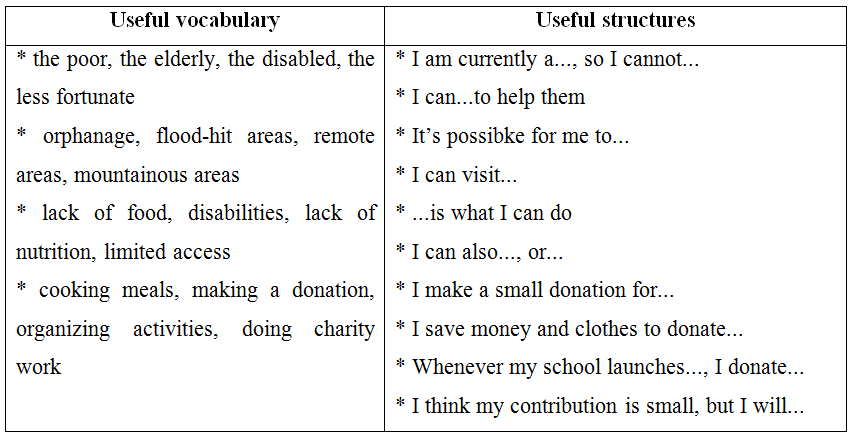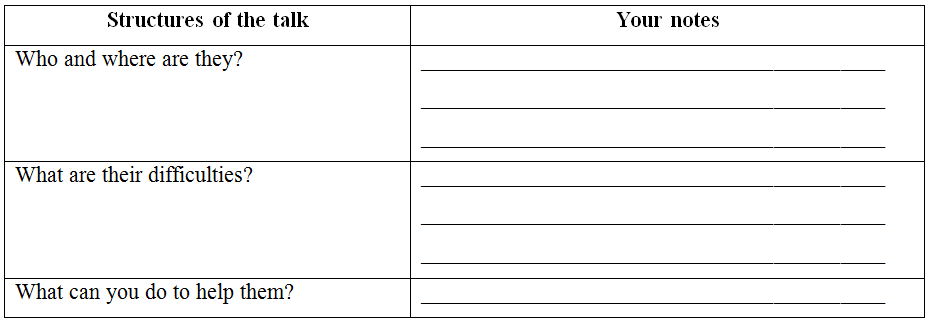Talk about what you think you can do to help people in need.
You can use the following questions as cues:
* Who and where are they?
* What are their difficulties?
* What can you do to help them?
Useful languages:

Complete the notes:

Now you try!
Give your answer using the following cues. You should speak for 1-2 minutes.
1. I am currently a..., so I cannot...
2. I can...to help them
3. I can visit...
4. I can also..., or...
5. I make a small donation for...
6. Whenever my school launches..., I donate...
7. I think my contribution is small, but I will...
Now you tick!
Did you ...
- answer all the questions in the task?
- give some details to each main point?
- speak slowly and fluently with only some hesitation?
- use vocabulary wide enough to talk about the topic?
- use various sentence structures (simple, compound, complex) accurately?
- pronounce correctly (vowels, consonants, stress, intonation)?
Let’s compare!
Finally, compare with the sample answer on page 190.
 Giải bởi Vietjack
Giải bởi Vietjack
Talk about what you think you can do to help people in need.
Dịch nghĩa câu hỏi:
Nói về điều mà bạn nghĩ bạn có thể làm để giúp những người cần sự giúp đỡ.
Bạn có thể sử dụng các câu hỏi sau đây làm gợi ý:
* Họ là ai và ở đâu?
* Khó khăn của họ là gì?
* Bạn có thể làm gì để giúp đỡ họ?
Gợi ý câu hỏi:
MAIN IDEAS (Ý CHÍNH)
Who (ai)
* the poor (n. phr.) (người nghèo)
* the elderly (n. phr.) (người già)
* the disabled (n. phr.) (người khuyết tật)
* the less fortunate (n. phr.) (người kém may mắn)
Where (Ở đâu)
* orphanage (n.) (trại trẻ mồ côi)
* flood-hit areas (n.phr.) (vùng bị lũ lụt)
* remote areas (n. phr.) (vùng sâu vùng xa)
* mountainous areas (n. phr.) (vùng núi)
Difficulties (Khó khăn)
* lack of food (n. phr.) (thiếu thực phẩm)
* disabilities (n.) (khuyết tật)
* lack of nutrition (n. phr.) (thiếu dinh dưỡng)
* limited access (n. phr.) (tiếp cận hạn chế)
Support (Hỗ trợ)
* make a donation (v. phr.) (quyên góp)
* organize activities (v. phr.) (tổ chức các hoạt động)
* do charity work (v. phr.) (làm công việc từ thiện)
* cook meals (v. phr.) (nấu ăn)
Bài mẫu:
I am currently a high school student, so I cannot financially support people in need. However, I can do lots of work to help them. Firstly, I have general housekeeping skills so whenever I have a chance to visit an orphanage, I can sweep the floor or make the beds for children there. I can also cook some simple dishes, or help the cooks prepare meals. After all the children finish their meals, I can wash the dishes too.
Besides, I make a small donation sometimes. Whenever my school launches a campaign to help people in flooded areas, or less fortunate children living in remote and mountainous areas, I donate food, books, toys, and some clothes. I think all I can do is not a big deal, but I am trying to help, and I hope that those people will be supported and have a better life.
Hiện tại tôi đang là một học sinh cấp ba, vì vậy tôi không thể hỗ trợ tài chính cho những người cần được giúp đỡ. Tuy nhiên, tôi có thể làm rất nhiều việc để giúp họ. Đầu tiên, tôi có kỹ năng làm việc nhà nên bất cứ khi nào tôi có cơ hội đến thăm trại trẻ mò côi, tôi có thể quét sàn nhà hoặc dọn giường cho trẻ em ở đó. Tôi cũng có thể nấu một số món ăn đơn giản, hoặc giúp nhà bếp chuẩn bị bữa ăn. Sau khi tất cả trẻ em ăn xong, tôi cũng có thể rửa bát.
Bên cạnh đó, đôi khi tôi cũng quyên góp một chút ít. Bất cứ khi nào trường tôi phát động một chiến dịch giúp đỡ những người ở những vùng bị lũ lụt, hoặc những đứa trẻ kém may mắn sống ở vùng sâu vùng xa, tôi đều quyên góp thực phẩm, sách, đồ chơi và một ít quần áo. Tôi nghĩ tất cả những gì tôi có thể làm không có gì to tát cả, nhưng tôi đang cố gắng giúp đỡ và tôi hy vọng rằng những người kém may mắn đó sẽ được hỗ trợ và có một cuộc sống tốt hơn.Gói VIP thi online tại VietJack (chỉ 400k/1 năm học), luyện tập gần 1 triệu câu hỏi có đáp án chi tiết
4. It is_________to use words like ‘dumb’, ‘blind’ and ‘deaf’ to the disabled. (RESPECT)
3. He_________blind. He became visually impaired after an accident.
4. He began to teach English for disabled children in 2002. (since)
→____________________________________________
1. She has used a wheelchair since her bones (fracture)__________in the car accident last year.
Write an essay (150-180 words) about problems that people living in remote and mountainous areas in your country may face.
* You can use the following questions as cues:
* Who are they?
* What are their problems?
* Why do they have those problems?
__________________________________________________________________
__________________________________________________________________
__________________________________________________________________
__________________________________________________________________
__________________________________________________________________
__________________________________________________________________
__________________________________________________________________
__________________________________________________________________3. This campaign has been launched since 1999. (for 20 years)
→____________________________________________
1. The charity raises a fund of thousands of dollars for the underprivileged so far.
8. He has been a volunteer for Youth Blood Donor Organisation_________.
1. The last time I saw her was 5 years ago. (for)
→____________________________________________
1. People in my neighborhood have_________more than $400 to the charity.
1. This non-profit organisation_________milk for hundreds of children in this remote area.
13. International Day of Persons with disabilities_________since 1992.